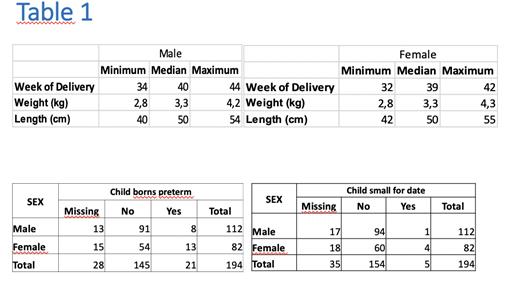Pregnancy in patients with chronic myeloid leukemia (CML) is no longer precluded. The literature published to date has mainly evaluated the management of CML and pregnancy with little mention of follow-up of children. This work aims to focus on the effects of the disease and of the drugs taken before conception and/or during pregnancy on fertility, gestation, pre-natal development of the fetus, and the growth of the child.
GIMEMA has promoted an observational retrospective/prospective study to harvest and study detailed information on both pregnancies in female CML patients and pregnancies of partners of male patients followed at participating centers. The information requested addressed information on demographic, CML- related (CML therapy before/during/after pregnancy; transcript kinetics; outcome post delivery), pregnancy-related (type of conception; abortion rate; pregnancy progression, delivery, breastfeeding), and baby-related (birth, physical, intellectual, emotional, behavioral, social and sexual development)
Data from 83 male patients (109 pregnancies) and 74 female patients (84 pregnancies) were evaluated for a total of 193 pregnancies at term. Fourteen (7 female and 7 male) conceptions were medically assisted, all the others spontaneous. One hundred ninety-four children were born (a twin pregnancy), 15 abortions were registered, 12 spontaneous and 3 voluntary all within the first trimester, while one pregnancy is still in progress. Eleven patients (1 male, 10 female) were diagnosed as having CML during pregnancy. Three patients interrupted pregnancy (2 electives).
All male patients, with the exception of two (one undergoing assisted reproduction and one in TFR), conceived during treatment. TKI used were Imatinib (71%), Nilotinib (22%), Dasatinib (2%), Bosutinib (4%) and Ponatinib (1%). The pregnancies carried out by the partners of the male patients did not show any problems, neither pre-conception, nor during gestation, nor at birth. An initial speech delay in a child was reported, with recovery after speech therapy. Most pregnancies result in spontaneous delivery around the 39th week of gestation. Ninety-two/109 babies were breastfed (84%)
The last TKI used in the female CML group was imatinib (43%), nilotinib (33%), dasatinib (22%), and Ponatinib (2%). Most patients stopped TKI at the FPT “first pregnancy test” (3-5 weeks). Cesarean deliveries amounted to 41%, just above the national average of 30%, with a mean of 38 weeks of gestation. Of the 84 babies born to women diagnosed with CML, only 20 were breastfed (23%).
Three patients treated with IFN at the time of delivery breastfed for about a month, while one breastfed for 9 months and did not resume TKI as she was well-controlled by IFN and eager to start a new pregnancy. The lack of assimilation of IFN through breast milk orally does not contraindicate breastfeeding.
In female patients, out of 84 pregnancies, and 1 in progress, 15 required antileukemic therapy during pregnancy.
IFN was administered in 13 gestations, and also during organogenesis. In one case the patient introduced IFN at 7 weeks, then stopped due to poor disease control and started Nilotinib at 21 weeks, after placenta formation.
In 2 gestations (including the one mentioned above) the patients took nilotinib (starting at 21 and 23 week of gestation). One patient was treated with imatinib at 20 week.
The evaluation of the pediatric population under examination was divided into four age groups: 0-3 years for the evaluation of birth and psycho-physical development; 3-6 years for cognitive development; >6 years for socialization and interaction with the surrounding environment, including school performance; >12 years for sexual and hormonal development.
Five infants were small for date. Of those, only one was exposed to imatinib from the 20th week of gestation. (Table 1). All children presented a rapid recovery after birth and their development is comparable to that of children belonging to the same age group.
The oldest child is 15 years old, and was born at 39 weeks to a father on TFR after suspension of imatinib therapy; the youngest is a 15 days old girl, born at 38 week to a mother treated with IFN during pregnancy.
From the results obtained from the study, children born to parents diagnosed with CML do not appear to show any difference compared to their peers in the general population, even if exposed to therapy in the prenatal period.
OffLabel Disclosure:
Abruzzese:Takeda: Consultancy; Pfizer: Consultancy; Novartis: Consultancy, Membership on an entity's Board of Directors or advisory committees; Incyte: Consultancy, Membership on an entity's Board of Directors or advisory committees; BMS: Consultancy, Membership on an entity's Board of Directors or advisory committees. Castagnetti:Pfizer: Consultancy, Honoraria, Research Funding; Bristol Myers Squibb: Honoraria; Incyte: Consultancy, Honoraria; Novartis: Consultancy, Honoraria, Research Funding. Iurlo:Novartis, Pfizer, Incyte, BMS, GSK, AOP Health: Honoraria. Giai:Alexion: Membership on an entity's Board of Directors or advisory committees; Sobi: Membership on an entity's Board of Directors or advisory committees; Novartis: Membership on an entity's Board of Directors or advisory committees. Stagno:Incyte, Novartis, Pfizer: Honoraria, Membership on an entity's Board of Directors or advisory committees, Speakers Bureau. Galimberti:Abbvie, Janssen, Novartis, Roche, Jazz, Astra Zeneca, Pfizer, Incyte: Speakers Bureau. Bocchia:Incyte: Honoraria; Novartis: Honoraria; BMS: Honoraria. Breccia:Pfizer: Honoraria; Novartis: Honoraria; Incyte: Honoraria; BMS: Honoraria; AOP: Honoraria; AbbVie: Honoraria. Cerrano:Insight Novartis Servier Abbvie Janssen Jazz Astellas Italfarmaco: Honoraria. Fozza:BMS: Research Funding; Amgen: Research Funding; Sanofi: Research Funding. Pane:Novartis: Research Funding, Speakers Bureau.
some patients were treated during pregnancy with TKI inhibitors and interferons


This feature is available to Subscribers Only
Sign In or Create an Account Close Modal